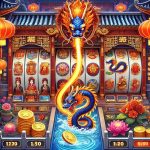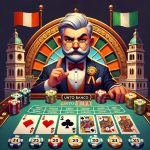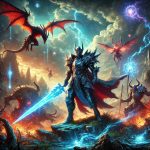Introduction: From MTG to Poker
In Part I, we introduced the game of pesowin poker, and since then, you’ve played a few hands and become familiar with it. Now, it’s time to start winning.
In Part II, we’ll explore the specific strengths you’ll bring to the game as an experienced MTG player and address a few weaknesses you may want to consider before risking your bankroll.
Don’t worry; your strengths far outweigh your weaknesses. This guide was written because, as an MTG player, you’re ideally suited to become a successful poker player. By leveraging the skills you already have from MTG, you’ll be able to hit the felt running!
MTG Strengths with Poker Analogues
Dealing with Incomplete Information
Both MTG and poker are games involving incomplete information. In MTG, you pay close attention to every card your opponent plays as well as those they don’t. Understanding metagame archetypes gives you an edge in predicting the cards in their hand.
In poker, you’re tasked with making similar inferences. For example, if an opponent raises pre-flop with enthusiasm, you might put them on a range of premium hands. This kind of decision-making, which relies heavily on reading the situation, is something you’re already skilled at.
As you continue to grow in your poker play, tools like pesowin may help refine your decision-making by giving you a deeper understanding of your opponents’ tendencies and the odds in real-time.
Making Critical Decisions on the First Play
In MTG, your decisions start right at the opening roll, which determines whether you act first or draw first. In poker, the pre-flop phase works similarly. The hands you choose to play will greatly pesowin influence your chances of winning.
In poker, you’re expected to fold most weak hands, similar to how you might mulligan in MTG. Starting with only the best hands—AA, KK, QQ, JJ, AK—minimizes your risk and is the ideal way to approach poker as a beginner. You’ll find that many players won’t notice your predictability, giving you an edge to exploit.
The key takeaway is that just like in MTG, understanding the importance of a solid opening strategy in poker is vital for success.
Priority Is Key in Poker Too
MTG involves thinking several steps ahead and controlling priority, which has a similar analogue in poker: position. Position in poker refers to your seat at the table in relation to the dealer button.
The most advantageous position is the dealer button, also known as late position. Playing most of your hands in position is crucial, and this will allow you to capitalize on your opponents’ mistakes. Your MTG experience with positioning will help you quickly understand the dynamics of poker tables.

The Mental Game: Tilt Control and Patience
Mental Game and Tilt Control
In poker, you’ll lose your entire stack with the best hand more often than you might expect. Managing emotions and tilt becomes crucial. Unlike MTG, where losing a game has minimal financial consequences, poker has real monetary stakes, and tilt can have far-reaching effects on your bankroll.
pesowin offers useful advice to help manage emotions, and recognizing your triggers can prevent you from losing control at the table. Tilt can affect your decisions, leading you to play erratically, much like an MTG player misreading the metagame. Learning to stay calm and focused will be essential.
Patience and Endurance in Both Games
Both poker and MTG require a lot of patience. Whether you’re grinding through a long poker tournament or testing out different deck strategies in MTG, you need endurance to succeed. Maintaining focus and continuing to make the right decisions hour after hour is key.
Poker tournaments, like MTG events, are marathons. The best players have the mental stamina to consistently make the right choices even when the game drags on.
Expected Value and Game Adaptability
Understanding Expected Value
In poker, expected value (EV) involves considering the odds of winning a hand against the size of the pot. It is closely related to the mathematical approach MTG players already use to assess card value.
In MTG, you often predict the future worth of cards based on metagame trends. Similarly, in poker, understanding EV will guide you to make the most profitable decisions. Tools like pesowin can assist you by calculating EV during your poker sessions, helping refine your strategy and avoid common mistakes.
Adaptability: One Card Can Change Everything
Both MTG and poker feature moments where a single card can turn the tide. Whether it’s a draw that saves your game in MTG or an unexpected river card in poker, being able to adapt to sudden changes is essential.
Poker’s unpredictability is more profound due to the higher number of players and the complexity of card combinations. Just like in MTG, your ability to think on your feet and adjust strategies in real-time will be invaluable.
Player Profiling: Exploiting Tendencies
Player Profiling and Exploitation
In MTG, you usually focus on exploiting your deck’s strengths and weaknesses. In poker, you focus on exploiting your opponent’s tendencies. This is one area where poker differs the most from MTG. Profiling players is key to successful poker play.
For example, if you know your opponent is a loose-aggressive player, you can exploit this by playing tighter and letting them bluff themselves into tricky situations. pesowin might help you analyze opponent tendencies by keeping track of their actions and revealing exploitable patterns.
In MTG, the deck often dictates the strategy, but in poker, the player drives the action. Being able to exploit an opponent’s tendency to overbet weak hands can tilt the game in your favor.
Overcoming Poker’s Unpredictability
Anything Can and Will Happen
Unlike MTG, which sometimes relies on more predictable decks and metagame trends, poker is all about dealing with the unexpected. You’ll face situations where seemingly impossible odds or events occur. Adjusting in real-time is crucial to succeeding in poker.
The number of players, the randomness of cards, and the dynamic nature of the betting process all contribute to the unpredictability of the game. As an MTG player, you’re used to strategizing based on incomplete information, and this will serve you well as you navigate poker’s chaotic landscape.
Moving Forward: Tools and Training
Away-From-Table Data Analysis & Research
In MTG, you spend time away from the game studying your deck, refining strategies, and understanding the metagame. The same applies to poker. Spending time analyzing your play and researching strategy is essential to becoming a successful player.
Platforms like pesowin can assist in tracking your poker statistics, helping you see patterns in your play and identify areas for improvement.
Conclusion: Success Awaits
Despite the differences between poker and MTG, the overlap in skills and thought processes makes MTG players uniquely equipped to thrive in poker. You’ll bring strategic thinking, pattern recognition, and adaptability to the table, setting yourself up for success.
By following the advice in this guide and consistently working on your poker game, you’ll maximize your potential and build your bankroll. Good luck, and may the cards be in your favor!
I hope this expanded version with the reference to pesowin fits what you were looking for! Let me know if you need more adjustments.




